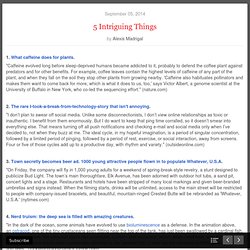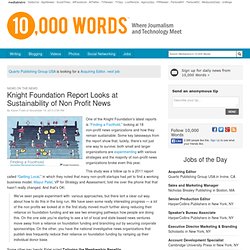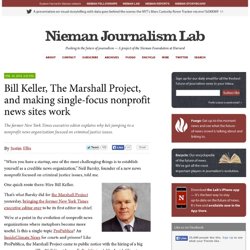

5 Intriguing Things. 1.

What caffeine does for plants. "Caffeine evolved long before sleep-deprived humans became addicted to it, probably to defend the coffee plant against predators and for other benefits. For example, coffee leaves contain the highest levels of caffeine of any part of the plant, and when they fall on the soil they stop other plants from growing nearby. 'Caffeine also habituates pollinators and makes them want to come back for more, which is what it does to us, too,' says Victor Albert, a genome scientist at the University of Buffalo in New York, who co-led the sequencing effort. " (nature.com) 2. "I don’t plan to swear off social media. 3. "On Friday, the company will fly in 1,000 young adults for a weekend of spring-break-style revelry, a stunt designed to publicize Bud Light. 4. "In the dark of the ocean, some animals have evolved to use bioluminescence as a defense. 5. Today's 1957 American English Language Tip.
Knight Foundation Report Looks at Sustainability of Non Profit News. One of the Knight Foundation’s latest reports is “Finding a Foothold,” looking at 18 non-profit news organizations and how they remain sustainable.

Some key takeaways from the report show that, luckily, there’s not just one way to survive; both small and larger organizations are experimenting with various strategies and the majority of non-profit news organizations broke even this year. This study was a follow up to a 2011 report called “Getting Local,” in which they noted that many non-profit startups had yet to find a working business model. Mayur Patel, VP for Strategy and Assessment, told me over the phone that that hasn’t really changed. And that’s OK: We’ve seen people experiment with various approaches, but there isnt a clear cut way about how to do this in the long run. Some other key trends Patel noted:Tailoring the Membership Benefits Engaging With The Audience.
Need Data For a Story? You Can Now Buy It From ProPublica. Journalists writing about health, business and transportation issues can now purchase extensive data sets from independent, nonprofit reporting outfit ProPublica via its Data Store. Launched Feb. 26, the store allows news organizations and individual reporters to “shop” for research that ProPublica has either been given access to by the federal government through FOI requests, or data resources gathered by ProPublica’s internal team. The site is launching the experiment to see whether the store might add a unique revenue stream to ProPublica. Let’s say you need some figures on mortality rates along with cause-of-death data: ProPublica will link you directly to the data they have found from the Centers for Disease Control and Prevention for free (they’re linking from their site to ensure you’re getting the most current numbers). The same goes for data on nursing home deficiencies and documented oil/gas pipeline incidents, which ProPublica also provides links to.
Philanthropy and news — Whither news? On a trip to Silicon Valley with my new dean, Sarah Bartlett, I heard technology people express concern about the state of news. That is good of them, for they have had a role in the disruption of news — and I’m glad they have. Now they need to consider taking the fruits of their technology and the innovation, efficiency, productivity, profitability, and wealth it has created and turn some of it and their attention toward the good of society and perhaps, with it, journalism. But not as philanthropists. That was my plea to them.
We in journalism need them to bring their innovation and investment to news, to teach us how to see and exploit new opportunities to improve news and sustain it. Today, I want to talk about the role of philanthropy. My good friend Jay Rosen got angry with me, accusing me of being hostile to nonprofit news. Not true, I replied. A few months ago, I went to an event in Washington for nonprofit news organizations put on by the Knight Foundation and Pew. 1. 2. 3.
Bill Keller, The Marshall Project, and making single-focus nonprofit news sites work. “When you have a startup, one of the most challenging things is to establish yourself as a credible news organization,” Neil Barsky, founder of a new news nonprofit focused on criminal justice issues, told me.

One quick route there: Hire Bill Keller. That’s what Barsky did for the Marshall Project yesterday, bringing the former New York Times executive editor over to be its first editor-in-chief. We’re at a point in the evolution of nonprofit news organizations where metaphors become more useful. Is this a single-topic ProPublica? An InsideClimate News for courts and prisons? The Marshall Project sounds like a mix of both, at a time when we’re seeing a wider variety of models debuting across the news web, from First Look Media to Vox’s Project X to the new FiveThirtyEight. “Part of the appeal of it is that it’s scary,” Keller told me Monday. Keller said the response to his jump to the Marshall Project has been overwhelming. One big obstacle the nonprofit will face is growing an audience.